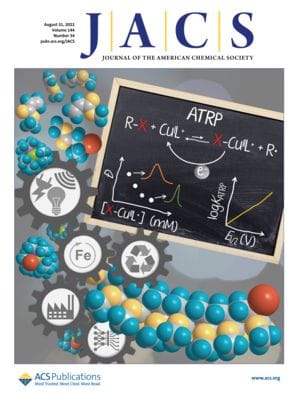In this interview, Dr. Carta shares insights on his experience publishing in ACS journals, read and publish agreements, open science workflows, and more.

As part of an ongoing series here on ACS Axial, we’re interviewing authors and librarians from around the world to find out more about their research, their published work, and the impact that open science is having on a changing landscape of research communication. This time, we talked to Dr. Mariolino Carta, Senior Lecturer in Chemistry at Swansea University.
I like that with open access all my papers can be read by everyone in the world.

What can you tell me about your group's current research focus?
My group mainly focuses on the structure, properties, and relationships of small molecules—and how these change when we alter the geometry of those molecules to make them monomers ready for polymerization. The kind of applications we look at include polymers of intrinsic microporosity (PIMs), which make them very good for gas separation applications—both mechanically based on pore size, and based on the diffusivity of the gases and other reagents into the polymers.
Mixing and matching these factors gives us the possibility of using the polymers for a variety of applications, including catalysis: in the same way that you can use functional groups to tune the solubility of certain gases, you can also use them to include active sites into the polymers which act as a catalyst to certain reactions. There are a lot more applications, but these are the most important ones that my group is focused on at the moment.
How would you describe the work in your paper, Tröger's Base Network Polymers of Intrinsic Microporosity (TB-PIMs) with Tunable Pore Size for Heterogeneous Catalysis?
It's not the first paper in the area, because I published another one a few years before which was the foundation of this work, but it's a topic I've always wanted to explore further. A lot of the feedback I got from my earlier paper at conferences was focused on how the very small pores in the polymers could not support very large substrates, which I completely agreed with—so I focused on creating a polymer that has pores that can “swell” under certain conditions. If they can expand their structures in the presence of a solvent, these PIMs would then be able to accommodate larger substrates, kind of like how a sponge expands when soaked in a solvent. This opens things up to a broader number of applications in catalysis, which is an area that hasn't been widely explored before. The fact that we could prove the expansion of the pores improved catalysis options was a big deal for us, which is why we approached a big journal like JACS with our findings.

Tröger’s Base Network Polymers of Intrinsic Microporosity (TB-PIMs) with Tunable Pore Size for Heterogeneous Catalysis
DOI: 10.1021/jacs.2c04739
What kind of impact do you think it's had?
It's one of the first papers specifically focused on the use of PIMs in catalysis, so it has some good citations so far. To date it doesn't have as many as citations as I would like, but I'm publishing more in this area and it could become a foundational paper. I think this is the problem when you're trying with something quite new on a certain topic: PIMs are well known for gas separation applications, gas storage, and carbon capture, but less for their potential in catalysis. I'm trying to push in that direction.
This was published in JACS—how would you describe the experience?
It was better than I expected. I've published in some big journals and the experience with JACS has been quite nice and smooth from the beginning. I got quite a quick response for the first decision by an editor, and the review process lasted longer than I thought it might—but again, with such high-impact journals, I expect that the selection of reviewers and length of the peer review process might take longer than other journals. You're anxious when you're publishing in such a big journal; you want to know the reviewer's responses straight away and of course that's not realistic! But I have to say that I was quite happy with the comments, they were very positive and constructive. I answered them all, and between the first round of review and the second, it didn't take that long to get accepted. I was very happy with the whole process.
The article was published OA under your institution’s agreement with ACS—how did you discover this was available?
A previous paper that I published in ACS Applied Materials & Interfaces was able to be made OA under a special agreement between UK universities and ACS, so I knew that option would be available for this article. Of course, for any scientist, open access is the best option because you reach a much broader audience in a much faster way. When my article was accepted, I just received the usual email from ACS asking me to fill in an agreement, and within a couple of days, the paper was published as OA. It was a pretty nice experience.
What are your thoughts on the concept of open access?
I think it's amazing—scientists and researchers should strive to publish open access everywhere. In the UK, our grants basically demand open access, but my support for OA is about more than that. On one side, we're producing work from taxpayers' money so it's fair for everyone to want to know how we're using their money, but to me, it's very important as a researcher that my work can be read everywhere, even by people who don't subscribe to a journal. Not everybody who could benefit from reading science has the privilege to subscribe to these journals, and I like that with open access all my papers can be read by everyone in the world. It brings more citations, and people are engaging with my research to build their own. I think it's great.
What are your thoughts on open science workflows (e.g. preprints, open data, transparent peer review) more generally?
I'm not a big fan of preprints in general, but that's mostly about perception: I don't see the real usefulness of preprints, apart from if I have something that's groundbreaking, I'm ready to publish some version of it, and I want to get it out as soon as possible before someone scoops me. I don't dislike them, but sometimes when I have a paper ready with a lot of supporting data, I prefer to submit directly to a journal.
With open data, all researchers receiving European and UK Research and Innovation grants need to produce data management plans and make sure the data is available online, wherever we publish, so we already have repositories for that purpose. I'm totally in favor of it, and feel that of course my data should be public. The same way as I want open access, I want my data open because I have nothing to hide.
What do you think are the biggest recent developments in open science and open access?
Although I don't use them myself, I like the idea of preprints because I really like that most of the publishers now accept papers even when an earlier version is on a preprint server. I remember before, and it wasn't ideal when certain journals didn't accept submissions that had been preprints. Basically you scooped your innovation by preprinting. Clearly this is not the case any more, so I really like that idea. As for open access, I like anything which is open access—it's kind of mandatory now, like I was saying, but I think it's mandatory for a good reason.
Where do you see OA in 10 years' time?
I think it's the default for scientists now to go open access. Unless I have to protect IP for a patent, but in that case I will not publish in a journal until the patent is granted, let alone put out a preprint. So apart from that, I think everything should be open access. The more that's open access, the better.
What I would really like is for some of the publishers to make open access more affordable, especially for small groups in a smaller university. Some of the prices for open access could be reduced or subsidized somehow, so that even smaller groups that don't have as much funding can publish in open access - even when they don't have an agreement between their university and the publisher.
What do you think you'd be doing if you weren't a researcher?
That's a very good question, and I don't really know. Maybe I could be a consultant, but I really love research because I am a curious guy, like all researchers should be. I get bored very easily with other kind of jobs.
There's a lot of stuff that I don't like around academic research positions: there's a lot of admin to do, and a lot of other rules to follow that distract me from my main goal, which is research. But they are part of the system, and I'm part of that system too, so I do what I need to. But I really don't know what I'd be doing if I wasn't a researcher, because I really love it.
